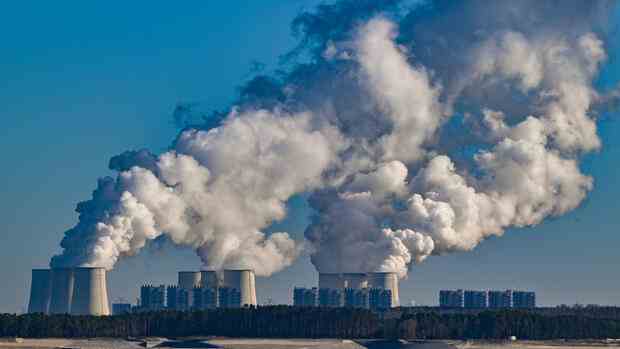Greenhouse gas emissions are increasing worldwide, partly due to the use of coal for energy production.
(Photo: dpa)
Berlin Not brave enough, not fast enough, not deep enough: this formula sums up global commitment to climate protection. “This synthesis report underlines the urgency of more ambitious measures,” said the chairman of the Intergovernmental Panel on Climate Change, Hoesung Lee, on the occasion of the presentation of the new report of the Intergovernmental Panel on Climate Change (IPCC) this Monday in Interlaken.
The so-called synthesis report of the sixth status report of the IPPC summarizes the state of science in recent years. The last synthesis report was published in 2018. Even then, the committee pointed out the major challenge of limiting global warming to 1.5 degrees Celsius in pre-industrial comparison.
The international community of states has agreed on this value. It is considered the limit for being able to contain the effects of climate change to a just tolerable extent. Scientists put global warming at 1.1 degrees Celsius. That alone has led to more frequent and more intense extreme weather events, it is said.
Five years later, the challenge of slowing global warming has become even greater. Greenhouse gas emissions are increasing worldwide. According to the panel’s current assessment, the speed and scope of the measures taken so far, as well as the current plans of the governments, are insufficient to combat climate change.
Matthias Garschagen is a climate researcher at the Ludwig Maximilians University in Munich and a member of the core author team of the current report. The risks associated with climate change have become greater than was thought a few years ago, the scientist said on Monday. This has to do with the fact that it is better known today “how sensitively the systems react and how various risks build up”. He hopes “that the report will help us to make more courageous, faster and more profound progress,” said the scientist on Monday.
Crucial decade has begun
The report makes it clear once again that the decisive decade has started to stop man-made climate change. According to the report, the decisions made over the next few years played a decisive role in our future and that of future generations.
According to current estimates by scientists, it is likely that the 1.5 degree limit will be exceeded before 2040. The projected CO2 emissions from the existing infrastructure for fossil fuels alone are higher than a global warming of 1.5 degrees would allow. An “immediate reduction in greenhouse gas emissions in all sectors in this decade” is required.
>> Also read here: Drought summer and microplastics – How the government wants to protect the water in Germany
If the 1.5-degree limit is exceeded, the states will not only have to present a balanced greenhouse gas balance later on, they will also have to step up their efforts to offset CO2 emissions that are harmful to the climate. But even a temporary overshoot brings “adverse, sometimes irreversible effects and additional risks” for society. “The time window is closing rapidly,” says climate researcher Garschagen.
Oliver Geden, also a member of the synthesis report’s core author team, said: “We need to start looking at a world beyond 1.5 degrees.”
The scientists also criticize the available funds. Accelerated climate protection measures would only be possible with a “multiple increase in funding”, it says. Governments are “the key” to reducing emissions. They could send “clear signals” to investors. But central banks and financial supervisory authorities could also play their part in the necessary transformation of the economy.
More: The climate crisis could cost Germany 900 billion euros

